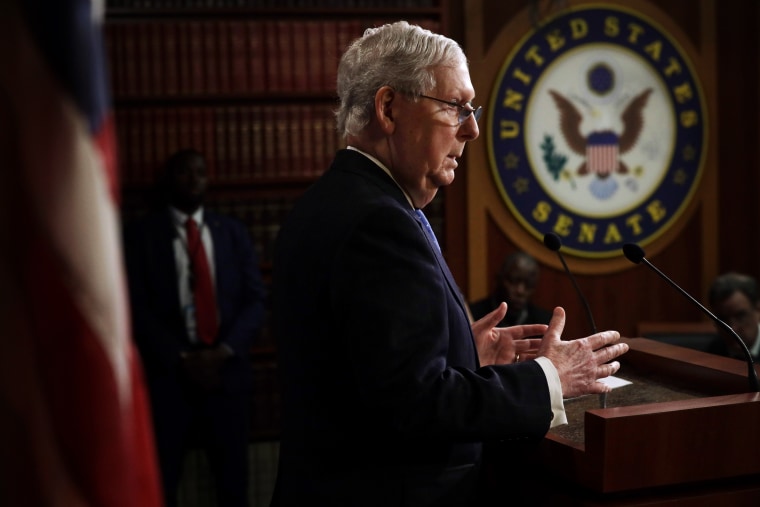WASHINGTON — As the Senate returns Monday after having been forced from the Capitol by the coronavirus outbreak, the next round of emergency relief legislation could be weeks away as Democrats, Republicans and the White House are pushing conflicting priorities for the next bill.
Republicans want liability protections for businesses. Democrats want more state and local government aid. And President Donald Trump wants to "pause" more legislation for now but won't consider anything that doesn't include a payroll tax cut.
"We're not doing anything unless we get a payroll tax cut," Trump said Sunday night during a Fox News town hall.
Trump has mused about a payroll tax cut throughout the coronavirus response efforts, but the proposal has gotten a lukewarm reception from Republicans and Democrats in Congress. Trump privately discussed a payroll tax cut with Senate Republicans ahead of the passage of the CARES Act, but the party never unified behind the idea.
Even if congressional Republicans were to get on board with Trump this time around, the president has suggested that — despite Democrats' calls to move quickly on the next phase of coronavirus relief — he is in no rush.
"I think we want to take a little bit of a pause," Trump told reporters Thursday at the White House.
White House economic adviser Larry Kudlow echoed Trump on Sunday, saying the White House was in a "pause period" on further coronavirus legislation.
"There may well be additional legislation," Kudlow said in an interview with CNN. "There's a kind of pause period right now. You know, we have put up $3 trillion of direct federal budget assistance in one way or another. The Federal Reserve has actually put in as much $4 to $6 trillion. So it's a huge, huge package."
Full coverage of the coronavirus outbreak
Senate Majority Leader Mitch McConnell, R-Ky., doesn't have any immediate plans to take up additional relief legislation, either. Instead, McConnell's focus will be on judicial nominations that have long been a priority of his.
But McConnell has made it clear that whenever negotiations do begin on the next phase of coronavirus legislation, he won't consider anything that doesn't include liability protections for businesses.
"Let me make it perfectly clear: The Senate is not interested in passing a bill that does not have liability protection," McConnell told Fox News last week, adding that liability protections were a "red line going forward on this bill."
On Tuesday, Trump signed an executive order compelling meat processing plants to stay open after the White House worried that some companies would close because of workers' falling ill.
"We have had some difficulty where they are having a liability where it's really unfair to them," Trump said. "I fully understand that it's not their fault."
McConnell has warned that without liability protections, businesses will be too fearful of litigation to reopen. Democrats have balked at the idea, warning that they won't support anything that weakens protections for workers.
"How does that make sense?" Senate Minority Leader Chuck Schumer, D-N.Y., asked in a phone call with reporters last week, accusing McConnell of "fighting to protect corporate executives."
Speaker Nancy Pelosi, D-Calif., said House Democrats won't support "immunity from liability" in the next bill.
"At the time of this coronavirus challenge, especially now, we have every reason to protect our workers and our patients in all of this," she said.
Instead, Democrats say the focus needs to be on swiftly providing state and local governments with additional aid.
The $2 trillion CARES Act included about $150 billion in state and local government funding. But governors say Treasury Department policy has kept them from being able to use the money to make up for revenue shortages.
Download the NBC News app for full coverage and alerts about the coronavirus outbreak
The National Governors Association, a bipartisan group, has called on Congress to allow governors to "use any state stabilization funds for replacement of lost revenue, and these funds should not be tied to only COVID-19 related expenses."
"This is something that is of the highest priority," Pelosi said of state aid Thursday, adding that the next bill needed to happen "now."
Pelosi has floated an additional $1 trillion of state aid, but Republican leadership has shown little interest. Trump has described more state funding as a "bailout" for "Democrat-run" states. McConnell suggested letting states go bankrupt, but he softened his position after he was heavily criticized by governors from both parties.
"There's no question all governors, regardless of party, would like to have more money. I'm open to discussing that," McConnell said Wednesday in an interview with Fox News Radio.
There is some bipartisan support for more state funding, as both red and blue states face significant budget shortfalls because of the coronavirus. Sen. Bill Cassidy, R-La., announced that he would introduce a bipartisan bill to provide more state funding with Sen. Bob Menendez, D-N.J., when the Senate returns Monday.
But in the same radio interview, McConnell reiterated that he wanted to prevent "the second pandemic," which he described as "lawsuits against doctors, nurses, hospitals and brave businesspeople opening up."

